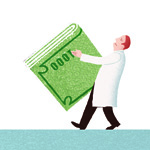Answer – and you’re closer to a grant: What’s in it for the EU - why should they give you a pile of money?
"We miss out on funding because we don’t adequately describe the impact that a grant giver like the EU would get out of supporting a project."

Says Associate Professor Peter Kristensen from the Department of Engineering - Molecular Engineering, who certainly has experience of applying for funding from the EU's framework programmes for research. In this particular context, it’s just as interesting that he is also an evaluator - that is, he is involved in assessing other researchers’ applications to the EU's new framework programme Horizon 2020 (H2020).
Is it obvious?
"As researchers we think scientifically, therefore we describe our project in scientific terms down to the smallest detail and then think that it must be obvious to the grant giver what they will get from supporting the project. But we thereby keep on falling into the same trap where we don’t communicate the result and outcome of the research clearly enough to the people who will be giving us the money."
The grant giver needs answers
In other words, in Peter Kristensen’s experience as a researcher and evaluator, researchers
must get better at providing clear answers to the questions that the grant givers ask when they look at an application.
"Such as: What would Europe get out of supporting the project in the competition with the USA? How can the EU differentiate itself in relation to Japan by supporting the project? Researchers often fail because they don’t describe the impact, and not necessarily because of the scientific content in an application."
On the other side of the desk
For Peter Kristensen, deciding to be an evaluator in the first round of H2020 is a completely conscious strategy.
"I’ve chosen to sit on the other side of the desk for this round because it gives me a greater understanding of what’s required for a successful application. I’ll get to evaluate 9 or 10 applications and I’ll use what I learn from that when I send in my own H2020 application in one of the later rounds this autumn."
Benefiting researchers
Other researchers at the Department of Engineering will also benefit from Peter Kristensen’s experience as an evaluator.
"At the Department of Engineering we have created a database with the names of evaluators, so that the researchers who are preparing an application can get a former evaluator to look it over before they submit it. In this way, we draw on one another’s experience at the department."
Member of expert group
Peter Kristensen is also a member of one of the six expert groups that have been established in order to attract more research funding to AU’s bank account. As an experienced researcher he benefits greatly from the academic discussions in his group.
However, he does not yet think the group has managed to spread much knowledge to the less experienced researchers in the academic environments, even though this is one of the scheme’s objectives.
"We actually discussed this at one of our latest meetings. We need to get better at telling the less experienced researchers how they can best cut through the red tape in the EU and elsewhere. But we still haven’t found the philosopher's stone in terms of the best way to contact the researchers out there in the research environments."
Translated by Peter Lambourne

